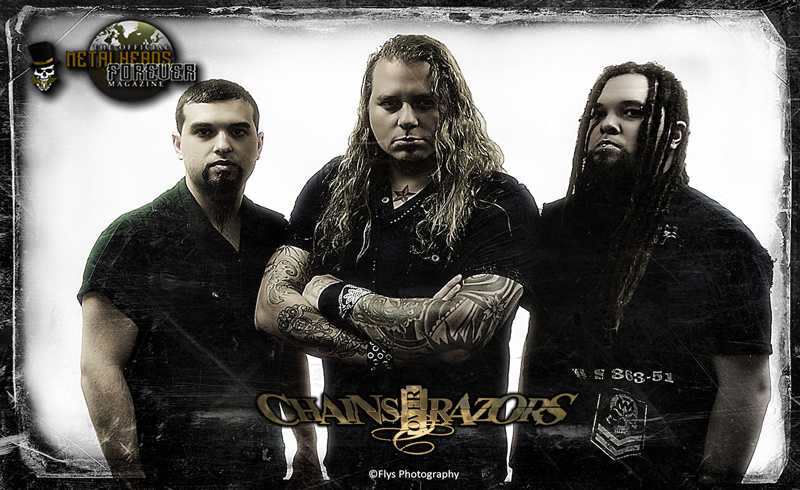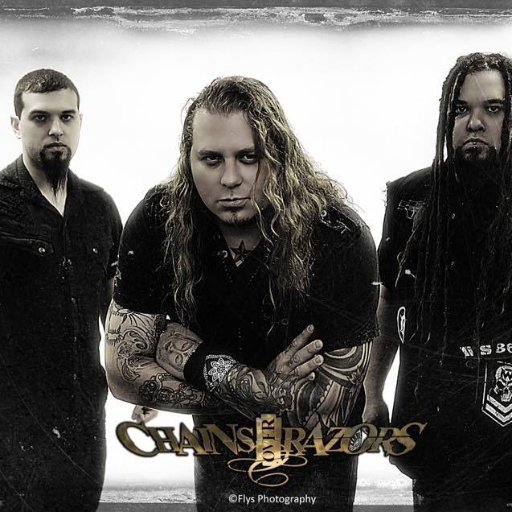Chains Over Razors by Michael Aronovitz
“Old Blood, New Ground”
Good things come in threes, and we gravitate toward them like old friends. As a thematic human design – man, woman, and child is as familiar to most of us as is Father, Son, and The Holy Spirit, and whether our particular circumstance varies in terms of siblings, single parents, or religious platforms, these patterns are embedded in our wiring and shared global persona. All of our stories have beginnings, middles, and ends. All of our stop lights are red, yellow, and green. We measure our current ability to manipulate resources in terms of bills, coin, or credit, and we gauge our behavior as passive, aggressive, or noncommittal.
Threes are universal. At the beginning of a race, you don’t say, “Ready…set…go…go,” and when your dad readied you for the bandage to be ripped off way back when, he didn’t just count to one unless he was playing that cruel little surprise card. Threes are critical. Birth, Life, Death. Stop, Drop, and Roll, and when you fuck up big enough to confess, it ain’t just two Hail Mary’s, now is it?
Still, if the number three is some sort of signifier for universal symmetry, why is rock music, and especially metal, so apparently in love with the number four? Most songs are written in 4/4 time. To begin a tune, unlike the commencement of any other event in human culture, you count to four as opposed to three. The basic rock phrase is accomplished with four beats played on a bass drum, snare, high hat, and crash cymbal, and most rock ‘n roll songs traditionally have had four parts: verse, chorus, bridge, and lead. Still, the most significant oddity here in singling out rock as compared with the rest of the world throughout history, is the design-preference for four in the set-up and positioning of performers, as exemplified for us in the early 60’s both by the Beatles, (bass, drum, and two guitars with one player doubling on vocals) and The Who (the power trio with vocalist as vocalist for vocalist’s sake).
The Beatles blueprint spawned powerful star-children in super-quartets like Kiss, Cinderella, and Metallica as well as Volbeat, Godsmack, and Halestorm, just like the Who’s family tree is chock full of gargantuan stadium faves like Queen, Van Halen, Led Zeppelin, Black Sabbath, Ozzy, Firehouse, and Pantera. Of course, the list goes on almost infinitely, and we could spend valuable time listing all the wonderful rock acts in both camps as well as the various key exceptions who have added respective players to fill in every possible space with a second guitarist who doesn’t sing, a third guitar, keys, violin, flute, or multiple percussionists, (Aerosmith, Skynyrd, Styx, Yes, Kansas, Jethro Tull, and The Grateful Dead respectively, and more recently Avenged Sevenfold, Lamb of God, and Slipknot), yet all of them are centered, at least in essence, off of the concept of the “holy four” as a base, making it damned clear that the formula is only enhanced by addition.
Conversely, of course, there are power trios like Rush, Triumph, The James Gang, and Motorhead, but were I to remove myself from personal bias and my deep seated allegiance to these projects, I could objectively argue that all of them, at least theoretically, might have sounded even better if they had had vocalists with a sole focus on his or her given expertise.
And in this lies our paradox. Hard rock has always been about rebellion, but its core equation hasn’t changed direction for more than half a century on account of the idea that if you strip it down to bare bones, the vocals get sacrificed (The best Racer X songs: Technical Difficulties and Scarified are perfect examples), or someone has to double up on something, therefore by default, lessening the importance of one or the other.
Not anymore.
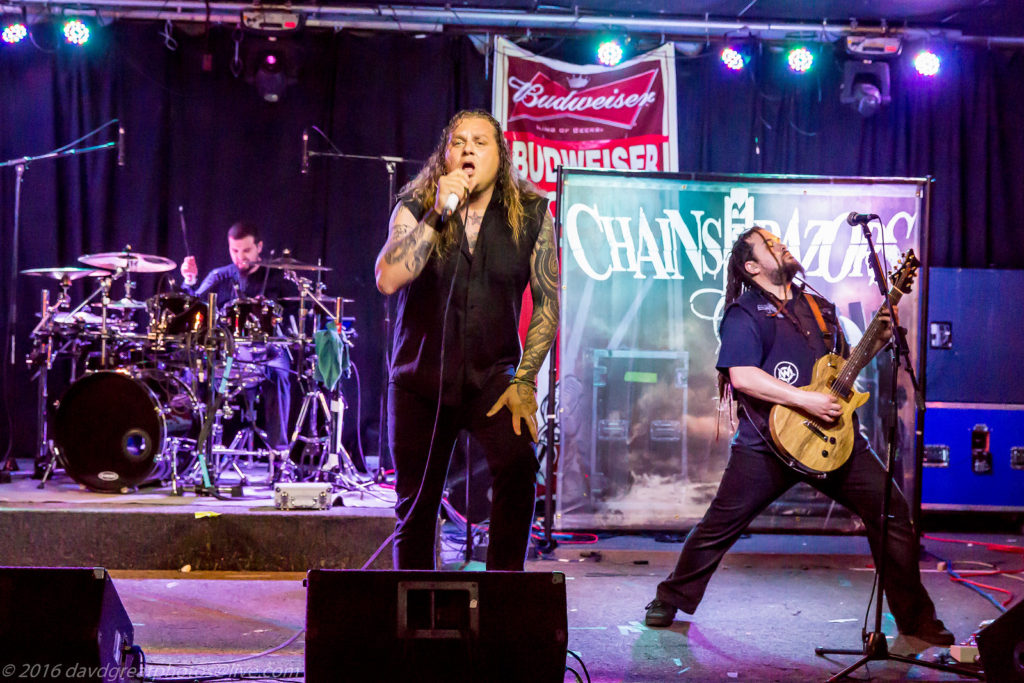 Enter Chains Over Razors, a band from Chicago, Illinois, introducing a startling aesthetic that has already re-set the bar, reinventing hard music in a way that will be studied, admired, discussed, argued over, imitated, and never quite equaled. They get our attention from the get-go with their name alone, and to briefly digress from our argument of threes versus fours for a hot minute, a band name doesn’t usually mean anything, not really, not apart from the phonetics. I no more picture making out with a hot chick when I hear the name “Kiss” than I think of an airplane or “You as well” when I happen to cross paths with the music of “U2.” But “Chains Over Razors” is worthy of a horror movie title, and being that I am a horror author constantly trying to find links between horror and metal, I cannot deny the immediate and glorious images this band name sparks in my mind…of some maniac’s basement torture chamber, real smock ‘n goggle stuff, with car batteries, handcuffs, meat hooks, blood spattered sink arrangements, boning and breaking knives, cleavers, hot brands, battle hatchets, barbed fishing line, walk-in freezers, and various high revving power tools. And considering the wonderful horror-metal model initiated by Sabbath and Alice Cooper, reanimated by Rob Zombie, Marilyn Manson, and Cannibal Corpse, and carried on by thousands of current legitimate metal bands, this puts Chains in good company.
Enter Chains Over Razors, a band from Chicago, Illinois, introducing a startling aesthetic that has already re-set the bar, reinventing hard music in a way that will be studied, admired, discussed, argued over, imitated, and never quite equaled. They get our attention from the get-go with their name alone, and to briefly digress from our argument of threes versus fours for a hot minute, a band name doesn’t usually mean anything, not really, not apart from the phonetics. I no more picture making out with a hot chick when I hear the name “Kiss” than I think of an airplane or “You as well” when I happen to cross paths with the music of “U2.” But “Chains Over Razors” is worthy of a horror movie title, and being that I am a horror author constantly trying to find links between horror and metal, I cannot deny the immediate and glorious images this band name sparks in my mind…of some maniac’s basement torture chamber, real smock ‘n goggle stuff, with car batteries, handcuffs, meat hooks, blood spattered sink arrangements, boning and breaking knives, cleavers, hot brands, battle hatchets, barbed fishing line, walk-in freezers, and various high revving power tools. And considering the wonderful horror-metal model initiated by Sabbath and Alice Cooper, reanimated by Rob Zombie, Marilyn Manson, and Cannibal Corpse, and carried on by thousands of current legitimate metal bands, this puts Chains in good company.
The band also meets current metal expectations by globally arranging their songs with riff oriented growl verses and traditionally sung choruses, and while it might seem contradictory that I call this project revolutionary and in the same breath claim they conform to industry standards, I just wanted to make it clear that this is a competitive metal band in a competitive market through which fans expect certain bench marks to be achieved right out of the chute.
So as for standards and compulsories, Chains Over Razors is a metal band and they rock.
They also do it without a bass player.
Whoa! Wait a minute! This is blasphemy! No bass means no bottom, and whether the musician in question plays roots or a pattern that stands out as its own entity, a bass player is absolutely essential. John Entwistle, Flea, Stanley Clarke, and Geddy Lee are staples, archetypes, heroes, and it is difficult to imagine how this concept is possible, especially live. Suddenly, we are filled with doubts, questions, and crazy assumptions, like maybe there is some sort of contractual agenda through which these guys keep it lean in the writing phase in order to avoid compromise and complications, next bringing some session guy on the road to fill in the holes, standing to the left of the drum kit in black jeans, a black tee shirt, and his hair in his face.
But this isn’t the case, and if we look closer at the way metal has been going lately, it becomes clear that Chains Over Razors is made up of trend setters poised at the very state of the art.
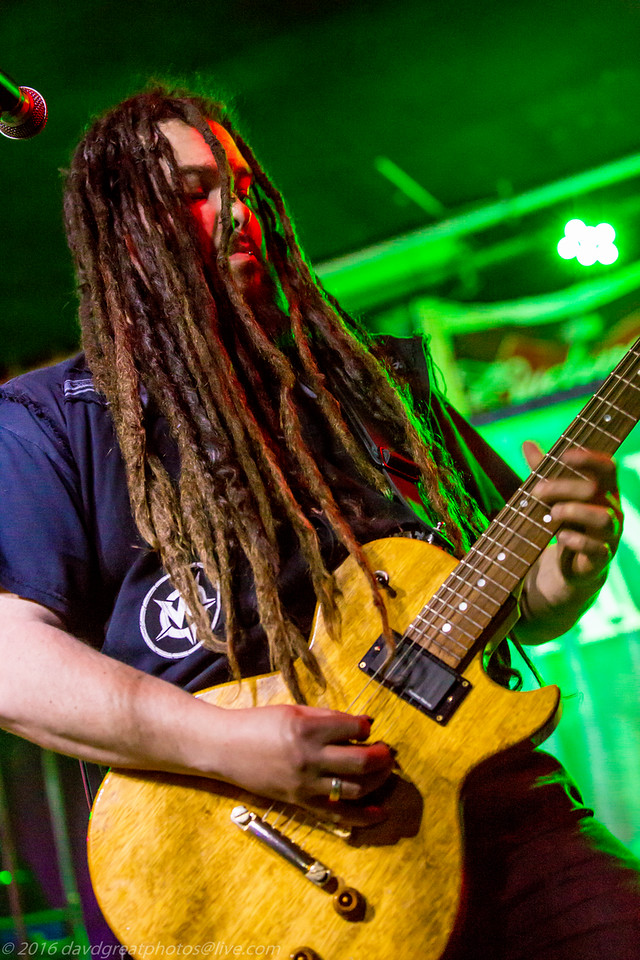 Look at it from a songwriting standpoint. The idea of the “lead guitar” has been undergoing a strange metamorphosis…in the old days – featured under a spotlight for a number of measures following the verses and chorus work. But nowadays, these platform solos have become more a thing of taste or effect. Guitar work has gone faster in general, yet has been relegated more to the verse-riff, that which has become more and more rich, driving, and complicated. Being that the percussion during the introductions and verses has also intensified in terms of speed and dexterity, metal has become more an art of rhythm and precision than ego and solo acrobatics.
Look at it from a songwriting standpoint. The idea of the “lead guitar” has been undergoing a strange metamorphosis…in the old days – featured under a spotlight for a number of measures following the verses and chorus work. But nowadays, these platform solos have become more a thing of taste or effect. Guitar work has gone faster in general, yet has been relegated more to the verse-riff, that which has become more and more rich, driving, and complicated. Being that the percussion during the introductions and verses has also intensified in terms of speed and dexterity, metal has become more an art of rhythm and precision than ego and solo acrobatics.
And Chains Over Razors is the tightest band I have ever seen. No, this is not opinion. This is not subjective, nor something based in emotion. It is pure truth, and you have to listen to them and watch them play live to understand that I do not speak from a place of favoritism or idealistic hyperbole. In fact, from a scientific standpoint, I will argue that they are the tightest band in musical history. And they do it without putting the vocal responsibility on one of the players. They have a specialist for this, and he is outstanding.
Plainly, Chains Over Razors is a power duo with a singer. They are Franco V Roc on vocals, Mike Vujasin on guitar, and his brother Andy Vujasin on drums, and they are tight. Razor tight. In a moment I will discuss how awesome and addictive their songs are, but for now I would ask that you please humor me just a bit more in my celebration of not only why this bold project has eliminated the idea of the bass player in general, but just how they accomplished it in terms of personnel, instrumentation, and song writing.
Not only are they razor tight, but they have redefined the concept of cohesion.
First of all, Mike and Andy are brothers, twins at that, and when I think of guitar players and drummers as siblings, I can’t help but feel that synchronicity is in their very blood. Or they practiced a lot together during various critical developmental periods over time, pick your position, nature or nurture, but either way one can’t deny the connection we hear and feel straight through to the backbone with the music of Eddie and Alex Van Halen, Dimebag Darrell and Vinnie Paul, and Lzzy Hale and her brother Arejay.
Secondly, the band has revolutionized the concept of “moving air,” a term that has probably been used with scores of bands through the years, all who figured out in the end that the phenomenon has nothing necessarily to do with volume. In the case of Chains Over Razors, it is accomplished first by tonality and clever electrical maneuvering. Mike plays a custom Les Paul seven stringed guitar tuned down for bottom and built in a way that allows him to play multiple melodies and rhythms simultaneously. Conjunctively, Andy has tuned his drum kit to specific note values based on his brother’s pitch, making the tom fills sink into the guitar work with added warmth and support and the double bass round out the bottom with more balls than we usually get from the more typical sixteenths played on a standard kit. On electro-technical grounds, Mike uses an octave pedal split between two amps (or stacks), custom-wired to cover a wider berth of the spectrum, and of equal importance to the above mentioned strategies, these two musicians also use speed, breaks, and dynamics in order to make “two” sound like halves completing a whole rather than some antiquated machine in need of a third wheel.
From this creative standpoint, the interchange between Mike and Andy adds even more thunder in the bass frequencies. When I asked them to describe to me this strange phenomenon, they were quite specific in illustrating that they are not so much two musicians “playing as one,” but more, a pair of artists moving patterns in and out of each other creating a super-sound impossible to accomplish with just a mirroring technique. To look at it dimensionally, in terms of the “internal,” Andy’s bottom-end patterns, especially with the double bass, “dance” around the rhythm with a groove, emphasizing the hook by jumping in and out of the guitar work, both players locking in and backing out, therefore using space and strategic interplay to create the illusion of the slap and pop of a bass guitar. In reference to the “external,” or the more general, holistic view, these two brothers construct an intricate, comprehensive portrait in no need of a bottom-border. It’s covered. And then some.
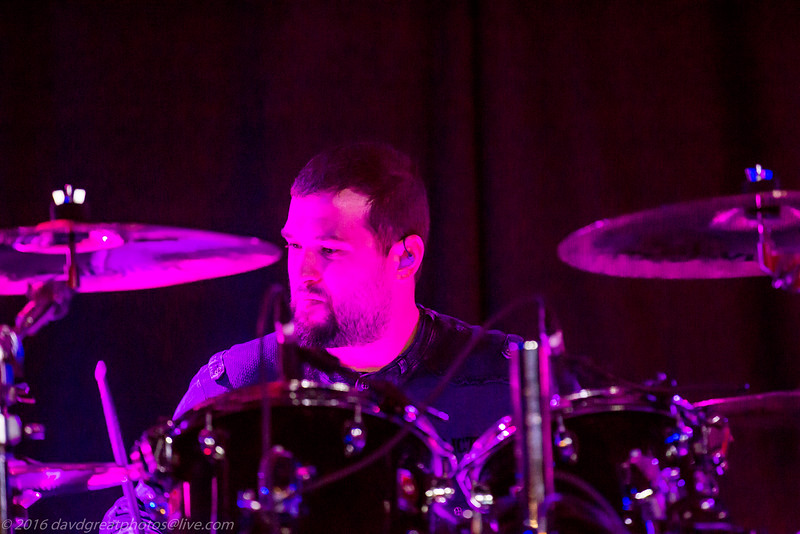 And now, there’s the music, the songs, the singer Franco V Roc who is an absolute stud belting out spine severing growls and heartfelt choruses that complete us, patterning with our emotions like Mike and Andy do with rhythm and tone, and maybe this is the way rock was always meant to be in its purest form. Three performers, all specialists, connecting with our bio-rhythms so we as audience members are ghosted in as that beloved fourth factor.
And now, there’s the music, the songs, the singer Franco V Roc who is an absolute stud belting out spine severing growls and heartfelt choruses that complete us, patterning with our emotions like Mike and Andy do with rhythm and tone, and maybe this is the way rock was always meant to be in its purest form. Three performers, all specialists, connecting with our bio-rhythms so we as audience members are ghosted in as that beloved fourth factor.
I initially listened to three Chains Over Razors songs off their album Crown the Villain, (released through Rocker Records just this past June 16th) and I was hooked immediately. From a listener’s standpoint, the tunes have a lot of sweet contradictions that work well together like the industrial heaviness clipped off by smart drum rolls closing each verse in Devil’s Eyes, and the deep groove followed by an atonal lead in Damnation, both surprisingly offset by a massive vocal hook in the choruses reminiscent of the work of the band Creed, but more passionate and fulfilling. Then in Only God Can Judge Me, there is an aura of pure metal funk with a progressive nuance, brought to a fever pitch with an incredibly catchy chorus and a bridge at the 2:30 mark that is spellbinding.
As mentioned, Franco V Roc is a boss, a star, and a vocalist that only needs to be heard once to be long remembered. And Mike and Andy Vujasin have literally rewritten the book on rhythm, melody, electric connectivity, and how these things interact with each other. They have shattered the concept of rock music and how it is formed, and scaled it down in a manner that is no less shocking or profound than the early work of Ernest Hemingway, and when he destroyed Victorian over-writing with his Aesthetic Theory of Omission.
And the songs are outstanding.
 As a last point, I wish to add that there is no way something like this could be accomplished without embracing tradition. This is not a cerebral statement, but more a practical one. When all is said and done, new projects, no matter how sophisticated, must appeal to the end user, and as fans, we bring our rock history with us in the form of a beloved banner, a war-flag, ripped and frayed at the edges at times, but no less significant or proudly flown. And if there is any testament to the tradition we know and love, it is that Chains Over Razors is produced by none other than Carmine Appice, THE historic rhythmic cornerstone of the style of music we so revere. I don’t think I have to inform too many readers at this juncture that Mr. Appice recorded with Vanilla Fudge, Cactus, Jeff Beck, Rod Stewart, and countless others, but in case you need a convincer, let me just put it this way. Bring your kid to the local music store for drum lessons. The book he will buy the first night is The Ultimate Realistic Rock Drum Method, by Carmine Appice. Talk about influence…
As a last point, I wish to add that there is no way something like this could be accomplished without embracing tradition. This is not a cerebral statement, but more a practical one. When all is said and done, new projects, no matter how sophisticated, must appeal to the end user, and as fans, we bring our rock history with us in the form of a beloved banner, a war-flag, ripped and frayed at the edges at times, but no less significant or proudly flown. And if there is any testament to the tradition we know and love, it is that Chains Over Razors is produced by none other than Carmine Appice, THE historic rhythmic cornerstone of the style of music we so revere. I don’t think I have to inform too many readers at this juncture that Mr. Appice recorded with Vanilla Fudge, Cactus, Jeff Beck, Rod Stewart, and countless others, but in case you need a convincer, let me just put it this way. Bring your kid to the local music store for drum lessons. The book he will buy the first night is The Ultimate Realistic Rock Drum Method, by Carmine Appice. Talk about influence…
In my brief discussion with Andy and Mike, I asked about Carmine Appice’s role in all this, and aside from his having to jokingly adjust to being “vaped out of the engineering room from their e-cigs,” he took the ideas from the band and gave feedback concerning what “took him for a ride” and “what slowed him down.” It was and is a relationship based on reinterpreting what the band already did and does best, and I can’t think of a better situation for both tutor and specialists. Andy told me that Carmine Appice helped him expand his bass drum creativity, like in live jam sessions and person to person tutorials. Seriously? Did you get any of it on a cell phone? My Lord, if I had Carmine Appice there showing me the ropes, I would never let him leave the rehearsal space, let alone watch him walk into the sunset without asking him if we could make a bid for a reality show that would blow everyone’s doors off!
Chains Over Razors. They have arrived. They have broken the paradox of three versus four, and have done so with an icon at their side, not casting shadows of the past, but using tradition and experience to harness the future.
Ladies and gentlemen, the future is now.
And Chains Over Razors ain’t fucking kidding.
Michael Aronovitz/ MHF Magazine
Michael Aronovitz is a horror author who has published three novels, two collections, more than thirty short stories, and a number of horror and metal reviews. His first novel “Alice Walks” will come out in E-book form through Cemetery Dance Publications this summer. His latest novel “Phantom Effect” can be seen on Amazon here: http://tinyurl.com/jcg59wo

